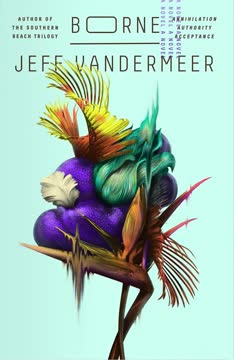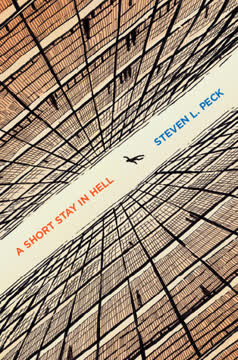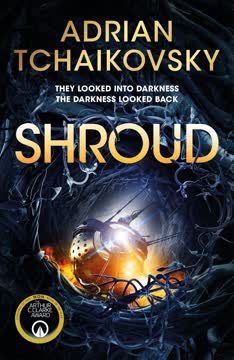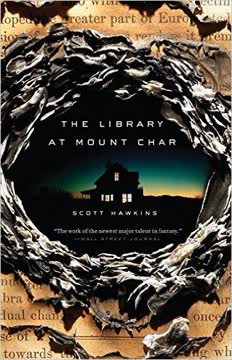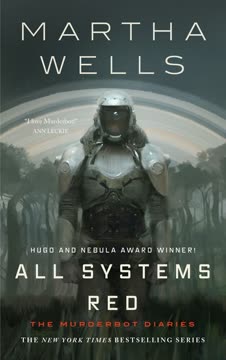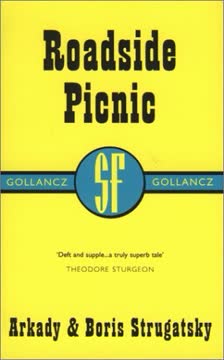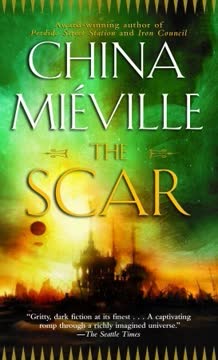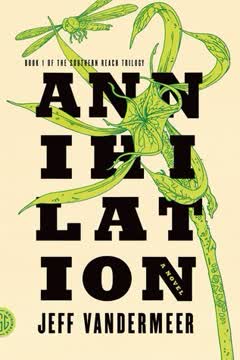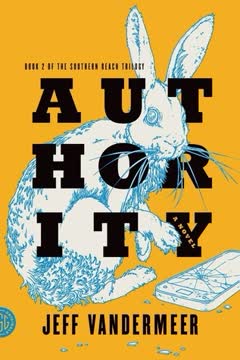Plot Summary
Salvage on Mord's Flank
On a day of gunmetal sun, Rachel, a survivor in a ruined biotech city, risks her life scavenging from the monstrous, levitating bear Mord. Amidst Mord's tangled, toxic fur, she discovers a strange, pulsing organism—Borne. At first, Borne is just salvage, a curiosity, but Rachel feels an inexplicable pull. The city is a wasteland of Company experiments gone awry, gangs, and death, but this find is different. Rachel's act of naming Borne marks the beginning of a bond that will upend her world. The moment is tinged with nostalgia and longing for a lost, safer past, but also with the dread and hope that something new has entered her life, something that might be more than just another piece of biotech trash.
Balcony Cliffs Sanctuary
Rachel brings Borne to the Balcony Cliffs, a hidden, booby-trapped sanctuary she shares with her partner Wick, a former Company scientist and memory-drug dealer. Their relationship is built on mutual need, secrecy, and the constant threat of violence from outside. Wick is wary of Borne, suspecting it could be a Company trap or weapon, but Rachel refuses to give Borne up. The sanctuary is both a fortress and a prison, its safety always temporary. Rachel and Wick's intimacy is shadowed by unspoken secrets and the knowledge that their resources—and trust—are running out. Borne's presence begins to subtly shift the balance between them, introducing new tensions and possibilities.
Borne's Awakening
Rachel cares for Borne, who rapidly evolves from a passive, plantlike organism into a sentient, mobile being. Borne's curiosity is insatiable; he mimics, asks endless questions, and develops a childlike personality. He learns to speak, read, and even joke, but his nature remains mysterious. Rachel is both delighted and unsettled by Borne's growth—he is innocent yet uncanny, capable of love and play but also of things she cannot predict. Wick's suspicion deepens as Borne's abilities become more apparent. The lines between pet, child, and threat blur, and Rachel's attachment to Borne grows, even as she hides his true nature from Wick.
Trust and Betrayal
Trust in the Balcony Cliffs is fragile. Rachel and Wick both spy on each other, searching for hidden truths in each other's rooms and pasts. Rachel discovers evidence of Wick's Company history and his role in creating dangerous biotech. Wick, in turn, fears Borne's influence on Rachel and suspects Borne is more than he appears. Their relationship is a dance of mutual dependence and suspicion, each withholding crucial information. Rachel's refusal to let Wick dissect Borne becomes a test of loyalty, while Wick's secrets about the Company and his own identity fester. The arrival of Borne has made trust both more necessary and more impossible.
The City's Ruins
The city is a landscape of devastation, ruled by Mord and haunted by the Company's failed experiments. Rachel scavenges for food and biotech, navigating dangers from mutated children, rival scavengers, and the unpredictable weather. The Magician, a rival power, encroaches on their territory, seeking control over the city's biotech. Rachel's memories of her lost family and refugee childhood surface, coloring her sense of self and her relationship with Borne. The city's violence is relentless, and every act of survival is tinged with guilt and loss. Rachel's encounter with violence—both as victim and perpetrator—deepens her sense of isolation and the precariousness of her humanity.
Borne's Growth and Games
Borne's development accelerates—he grows larger, more intelligent, and more independent. He delights in games, mimicry, and learning, but his powers are unsettling: he can change shape, absorb matter, and even people. Rachel tries to teach Borne about right and wrong, but his understanding is alien. Borne's innocence is complicated by his capacity for violence—he kills to protect Rachel, but also out of instinct. The boundaries between play and predation blur. Rachel's attempts to educate Borne are both touching and futile; he is both her greatest joy and her greatest fear. The question of Borne's purpose—weapon, person, or something else—becomes urgent.
The Magician's Shadow
The Magician, a former Company operative turned warlord, expands her influence, recruiting mutants and scavengers. She seeks control over Wick's biotech and the Balcony Cliffs, issuing ultimatums and orchestrating attacks. Her presence is felt as an ever-encroaching menace, destabilizing the fragile balance of power. Rachel's past encounter with the Magician reveals the depth of her ambition and ruthlessness. The Magician's manipulations force Rachel and Wick into increasingly desperate choices, testing their loyalty to each other and to Borne. The city becomes a battleground, and the threat of invasion looms over their sanctuary.
Violence and Vulnerability
Rachel is brutally attacked by a gang of mutated children, exposing the limits of her defenses and the vulnerability of the Balcony Cliffs. Borne, now capable of violence, kills her attackers to protect her, absorbing their memories and forms. The trauma deepens Rachel's bond with Borne but also her fear of what he is becoming. Wick's attempts to help are complicated by his own guilt and suspicion. The attack marks a turning point—Rachel can no longer deny Borne's capacity for harm, nor her own complicity in his actions. The lines between protector and threat, victim and perpetrator, blur irreparably.
Lessons and Losses
Rachel tries to teach Borne about morality, language, and the world, but his alien perspective resists her lessons. Borne's rapid growth and independence strain their relationship; he moves out, seeking privacy and purpose. Rachel's attempts to control or guide Borne falter—he is both too much like a child and too much unlike one. The pain of letting go is acute, as Rachel realizes she cannot protect Borne from the world or the world from Borne. The city's dangers escalate, and the threat of the Magician and Mord's proxies grows. Loss becomes the price of love and survival.
Borne's True Nature
Borne's ability to absorb and mimic others is revealed in a devastating confrontation—he has been impersonating Rachel and Wick, sowing confusion and distrust. Wick is injured, and Rachel is forced to confront the truth: Borne is a killer, unable to stop himself from consuming others. The betrayal is profound; Rachel banishes Borne from the Balcony Cliffs, breaking both their hearts. Borne's journal reveals his anguish and self-loathing, his desperate attempts to be good, and his ultimate failure. The exile is a wound that cannot heal, and Rachel is left to mourn the loss of her child, her friend, and her own innocence.
Siege and Separation
The Magician's ultimatum and the escalating violence of Mord's proxies culminate in an assault on the Balcony Cliffs. Rachel and Wick are forced to flee their home, navigating a city in chaos. Their journey is marked by exhaustion, injury, and the constant threat of death. The loss of their sanctuary is both physical and emotional—a stripping away of safety, identity, and hope. Wick's health deteriorates, and Rachel must care for him as they seek refuge. The city's collapse mirrors their own unraveling, and the possibility of renewal seems remote.
The Magician's Ultimatum
The Magician's power play forces Rachel and Wick into a corner—surrender the Balcony Cliffs and Borne, or face destruction. The city's factions vie for control, and the lines between friend and enemy blur. Rachel's encounter with the Magician in the Company's ruins reveals the depth of her ambition and the emptiness of her promises. The Magician's death at Rachel's hands is both an act of self-preservation and a final severing of the old order. The city is left leaderless, its future uncertain, and Rachel must reckon with the cost of survival.
Exile and Aftermath
In exile, Rachel and Wick struggle to survive, haunted by memories and the ghosts of their past. Wick's letter reveals the truth of Rachel's origins—her parents' death, her erased memories, and Wick's own inhuman nature. The revelation is both shattering and liberating, forcing Rachel to confront the constructed nature of identity and the possibility of forgiveness. The city is transformed by the final battle between Borne and Mord, a cataclysm that erases both monsters and leaves space for something new. Rachel's grief is profound, but so is her determination to endure.
The Battle of Monsters
Borne, transformed into a monstrous version of Mord, confronts the original bear in a titanic battle that devastates the city. The fight is both physical and symbolic—a struggle between creation and destruction, parent and child, past and future. Borne's final act is one of sacrifice, absorbing Mord and himself in a blinding flash of light. The city is left changed—cleansed by rain, overgrown with new life, and freed from the tyranny of monsters. The battle is both an ending and a beginning, a moment of loss and the possibility of renewal.
The Company's Secrets
In the ruins of the Company, Rachel uncovers the truth about its experiments, the origins of Borne, and Wick's role in creating Mord. The Company's legacy is one of exploitation, abandonment, and unintended consequences. The discovery of dormant Borne pods and the failed gateway to another world underscores the futility of the Company's ambitions. Rachel's act of killing the Magician is both a rejection of the old order and an assertion of agency. The city's future is uncertain, but the past's grip has been broken.
Letters and Revelations
Wick's letter reveals the full extent of his secrets—his role in Rachel's memory loss, his inhuman origins, and his complicity in the Company's crimes. Rachel is forced to confront the constructed nature of her identity and the possibility of forgiveness. The letter is both a confession and a plea for understanding, a final act of vulnerability. Rachel's response is complex—anger, grief, and ultimately acceptance. The possibility of love and redemption emerges from the ruins of betrayal.
Renewal and Remembrance
With the monsters gone and the city transformed, Rachel and Wick return to the Balcony Cliffs, rebuilding their home and welcoming others. The city is still dangerous, but new life flourishes—children, animals, and the remnants of biotech. Rachel becomes a caretaker and teacher, finding meaning in small acts of kindness and connection. The memory of Borne lingers, both as a warning and a source of hope. The past cannot be undone, but the future is open, shaped by the choices of those who remain.
Becoming Human Again
Rachel and Wick, scarred by loss and betrayal, find a measure of peace in each other and in the community they build. The return of a silent, diminished Borne is both a reminder of what was lost and a symbol of endurance. The city's wounds are deep, but life persists. Rachel's journey—from scavenger and survivor to caretaker and creator—is one of becoming human again, of reclaiming agency and hope in a world remade by catastrophe. The story ends not with triumph, but with the quiet, stubborn persistence of life and love.
Characters
Rachel
Rachel is the novel's narrator and emotional core—a refugee haunted by loss, trauma, and the struggle to survive in a ruined city. Her relationship with Borne evolves from caretaker to mother to adversary, reflecting her own longing for connection and fear of vulnerability. Rachel's partnership with Wick is fraught with secrecy, guilt, and mutual dependence; their love is both a refuge and a source of pain. Rachel's psychological journey is one of reckoning with her past—her erased memories, her parents' death, and her complicity in violence. She is defined by her resilience, her capacity for love, and her willingness to make impossible choices. Rachel's arc is a search for meaning and humanity in a world that has lost both.
Borne
Borne is a biotech organism of unknown origin, discovered by Rachel and raised in the Balcony Cliffs. He is childlike, curious, and eager to please, but also alien and dangerous. Borne's ability to absorb and mimic others blurs the line between person and weapon, innocence and predation. His rapid growth and learning are both wondrous and terrifying; he is shaped by Rachel's love but ultimately cannot escape his nature. Borne's struggle to be "good," to understand right and wrong, is deeply poignant, as is his ultimate exile. He embodies the novel's central questions about identity, agency, and the costs of creation. Borne's fate is both tragic and redemptive—a sacrifice that makes renewal possible.
Wick
Wick is a former Company scientist, memory-drug dealer, and Rachel's partner. He is resourceful, intelligent, and deeply damaged by guilt over his role in the Company's atrocities—especially the creation of Mord. Wick's relationship with Rachel is marked by love, secrecy, and mutual dependence; his inability to fully trust or be trusted is a source of ongoing tension. Wick's own identity is unstable—he is revealed to be more biotech than human, a fact he hides even from himself. His letter to Rachel is a confession and a plea for forgiveness, exposing the depth of his self-loathing and longing for redemption. Wick's arc is one of seeking humanity through love and atonement.
Mord
Mord is the city's most terrifying creation—a giant, flying bear engineered by the Company as a weapon and enforcer. Once human, Mord has become a force of nature, both protector and destroyer, worshipped and feared. His presence shapes the city's landscape and the lives of its inhabitants. Mord's relationship to Wick and the Company is one of betrayal and rage; his battle with Borne is both literal and symbolic—a struggle between past and future, creator and creation. Mord's ultimate defeat marks the end of an era and the possibility of renewal.
The Magician
The Magician is a former Company operative turned warlord, seeking to control the city's biotech and impose her own order. She is cunning, ruthless, and charismatic, recruiting mutants and scavengers to her cause. The Magician's relationship with Wick is one of mutual exploitation and betrayal; her interest in Rachel is both personal and strategic. She embodies the dangers of unchecked ambition and the seductive promise of power. Her death at Rachel's hands is both a rejection of the old order and a necessary act of self-preservation.
The City
The city itself is a character—a devastated, ever-shifting environment shaped by the Company's experiments, Mord's rampages, and the struggles of its inhabitants. It is both setting and antagonist, a place of danger, memory, and possibility. The city's ruins are haunted by violence, loss, and the remnants of failed utopias. Its transformation in the wake of Borne and Mord's battle is both a symbol of hope and a reminder of the costs of survival.
The Balcony Cliffs
The Balcony Cliffs is Rachel and Wick's refuge—a labyrinthine, booby-trapped sanctuary that offers safety but also isolation. It is a microcosm of their relationship—fortified, secretive, and always under threat. The loss and eventual reclamation of the Balcony Cliffs mirror the characters' emotional journeys, from fear and suspicion to tentative hope and community.
The Mutant Children
The mutant children are products of the Company's and the Magician's experiments—feral, violent, and tragic. They embody the city's cycle of abuse and abandonment, both victims and perpetrators of violence. Their attacks on Rachel and others are both a source of trauma and a reminder of the world's brokenness. Some find redemption or community; others are lost to madness and violence.
The Fox
The fox is a recurring presence—sometimes animal, sometimes biotech, sometimes something more. She guides Rachel, leads her to Borne, and observes the unfolding drama with enigmatic detachment. The fox represents the city's hidden intelligence, the possibility of new forms of life and agency emerging from the ruins. Her role is ambiguous—neither friend nor foe, but a catalyst for change.
The Company
The Company is the unseen force behind the city's devastation—a biotech corporation whose experiments have unleashed chaos and suffering. Its legacy is one of exploitation, abandonment, and unintended consequences. The Company's secrets, revealed in the ruins, underscore the futility of its ambitions and the costs of unchecked power. Its absence is as significant as its presence, shaping the lives and choices of all the characters.
Plot Devices
Unreliable Memory and Identity
The novel's structure is built on unreliable memory—Rachel's erased past, Wick's hidden identity, Borne's absorption of others. Characters' sense of self is constantly in flux, shaped by trauma, manipulation, and the need to survive. The use of memory beetles, erased histories, and mimicry blurs the line between truth and fiction, person and weapon. This device creates suspense, deepens psychological complexity, and underscores the theme that identity is constructed, fragile, and always at risk.
Biotech as Metaphor and Threat
Biotech pervades every aspect of the world—creatures, weapons, drugs, even the city itself. It is both a source of wonder and horror, enabling survival but also unleashing uncontrollable dangers. Borne, Mord, and the mutant children embody the double-edged nature of creation—innocence and monstrosity, hope and destruction. The proliferation of biotech raises questions about agency, responsibility, and the costs of playing god.
Parent-Child Dynamics
The relationship between Rachel and Borne is at the heart of the novel—a complex, shifting dynamic of parent and child, creator and creation, love and fear. Rachel's attempts to teach, protect, and ultimately exile Borne mirror the universal pain of parenting—nurturing something that must eventually become independent, and may become dangerous. The motif recurs in Wick's relationship to Mord, the Company's to its creations, and the city's to its lost children.
Foreshadowing and Symbolism
The novel is rich in foreshadowing—Rachel's early sense of Borne's danger, the city's cycles of violence, the presence of the fox, the recurring motif of the river and the sea. Symbols such as the Balcony Cliffs, the holding ponds, and the silver wall in the Company's ruins carry layered meanings—sanctuary and prison, memory and oblivion, hope and futility. These devices create a sense of inevitability and resonance, deepening the emotional impact.
Epistolary Confession
Wick's letter to Rachel serves as a crucial plot device, revealing hidden truths, reshaping the reader's understanding of past events, and forcing Rachel to confront her own identity and capacity for forgiveness. The letter's confessional tone and delayed revelation heighten suspense and emotional intensity, providing catharsis and a path toward healing.
Cataclysmic Climax and Renewal
The final confrontation between Borne and Mord is both a literal and symbolic apocalypse—a battle that destroys the old order and makes space for something new. The aftermath—a city cleansed by rain, overgrown with new life, and freed from monsters—embodies the possibility of renewal, even in the wake of unimaginable loss. The cyclical nature of destruction and creation is a central structural device, echoing throughout the narrative.
Analysis
Jeff VanderMeer's Borne is a haunting meditation on creation, trauma, and the search for meaning in a world undone by human ambition. Through the lens of a post-apocalyptic city overrun by biotech monstrosities, the novel interrogates the boundaries between person and weapon, parent and child, memory and identity. Rachel's journey—from scavenger and survivor to reluctant mother and, finally, to a creator of community—mirrors the struggle to reclaim agency and hope amid devastation. Borne, as both innocent and monster, embodies the dangers and wonders of unchecked creation, the pain of loving what cannot be controlled, and the tragedy of exile. The novel's use of unreliable memory, shifting identities, and layered symbolism deepens its psychological resonance, inviting readers to question the stories we tell ourselves and the costs of forgetting or remembering. In the end, Borne offers no easy redemption—only the stubborn persistence of life, the possibility of forgiveness, and the quiet, ongoing work of becoming human again. Its lessons are urgent for a modern world grappling with the consequences of technological hubris, environmental collapse, and the longing for connection in the face of loss.
Last updated:
Review Summary
Borne is a post-apocalyptic novel featuring a giant flying bear and a mysterious creature named Borne. Readers praised VanderMeer's vivid world-building, imaginative storytelling, and exploration of themes like parenthood and humanity. Many found the book emotionally engaging, with complex characters and beautiful prose. Some criticized the pacing and found it challenging to follow at times. Overall, most reviewers appreciated the unique blend of dystopian sci-fi and literary fiction, though some struggled with its weirdness and ambiguity.
Borne Series Series
Similar Books
Download PDF
Download EPUB
.epub digital book format is ideal for reading ebooks on phones, tablets, and e-readers.
